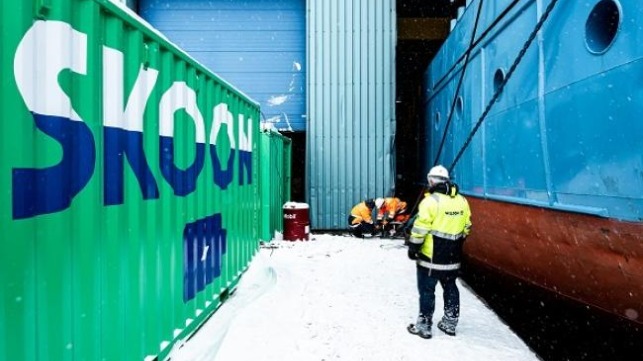Amsterdam Tests Shore Power for Shortsea Vessels Using Batteries

As part of the effort to make the port environment more sustainable and improve air quality, the Port of Amsterdam working with the Dutch shipping company Wilson Eurocarriers conducted the first test of shore power for shortsea vessels at a terminal.
The test was carried out on a 3,500 dwt shortsea cargo vessel the Wilson Goole while it was docked at the terminal in Amsterdam. Power was supplied for a battery unit housed in a shipping container provided by SKOON and which can be transported to the locations where power is required.
According to the port, the power was also sustainability developed. The battery can supply green energy anywhere in Amsterdam and is then filled with local wind energy from Windpark Ruigoord or with energy from biomass from AEB. With this, it is capable of supplying 630 kWh of electricity, which equates to at least twelve hours of shore power.
The test shows the Port of Amsterdam said that it is possible to provide large ships with energy on a regular basis utilizing a battery. On locations with a small grid connection, up to 550 kW of peak power can be supplied for longer periods. This has recently been done in cooperation with the Shared Energy Platform, an initiative of the Port of Amsterdam to increase the available capacity in the electricity grid.
While the battery test is another step towards a more sustainable shipping industry, the port cautioned that there are challenges to completing this operation and that it requires cooperation from the terminal operator and the shipowner.
Wilson, which sails to Amsterdam on a weekly basis, reports that it has already made modifications to 80 of its 126 ships so that they can use cold ironing in ports where it is available.

that matters most
Get the latest maritime news delivered to your inbox daily.
"We think it is important to make optimal use of the possibilities of shore power,” said Robert Bravenboer, Director at Wilson Agency. “Hopefully this will soon become the standard in all ports. We believe that the sustainability of ports will increase rapidly and we are happy to contribute to this. We are very happy that we were able to do this pilot in Amsterdam.” In 2019, Wilson also cooperated with the Port of Rotterdam for a trial for shore power applied to one of the company’s shortsea coal vessels. That test was also carried out with a battery system in a container positioned at the terminal for the trial.
The use of cold ironing is growing in the ports for shortsea and inland vessels as a step to improve the environment in and around the ports of Europe. It is also an important demonstration of the capabilities as the EU moves ban emission from all ships at the dock requiring the use of batteries or shore power stations.
